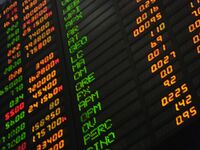Finance:Extended-hours trading
The examples and perspective in this article deal primarily with the United States and do not represent a worldwide view of the subject. (June 2020) (Learn how and when to remove this template message) |
| Financial markets |
|---|
 |
| Bond market |
| Stock market |
| Other markets |
| Over-the-counter (off-exchange) |
| Trading |
| Related areas |
Extended-hours trading (or electronic trading hours, ETH) is stock trading that happens either before or after the trading day regular trading hours (RTH) of a stock exchange, i.e., pre-market trading or after-hours trading.[1]
After-hours trading is the name for buying and selling of securities when the major markets are closed.[2] Since 1985, the regular trading hours for major exchanges in the United States, such as the New York Stock Exchange and the Nasdaq stock market, have been from 9:30 a.m. to 4:00 p.m. Eastern Time (ET).[3] Pre-market trading occurs from 4:00 a.m. to 9:30 a.m. ET, although the majority of the volume and liquidity come to the pre-market at 8:00 a.m. ET.[4][5] After-hours trading on a day with a normal session occurs from 4:00 p.m. to 8:00 p.m. ET.[5] Market makers and specialists generally do not participate in after-hours trading, which can limit liquidity.[6]

Trading outside regular hours is not a new phenomenon but used to be limited to high-net-worth investors and institutional investors like mutual funds.[7] The emergence of private trading systems, known as electronic communication networks (ECNs), has allowed individual investors to participate in after-hours trading. Pre-market trading and after-hours trading is all processed through ECNs including NYSE Arca.[8]
Financial Industry Regulatory Authority (FINRA) members who voluntarily enter quotations during the after-hours session are required to comply with all applicable limit order protection and display rules (e.g., the Manning rule and the SEC order handling rules).[9]
See also
- Trading day
- Stock exchange halts and suspensions
- List of stock exchanges
- List of stock exchange trading hours
References
- ↑ "Extended Trading". https://www.nasdaq.com/market-activity/quotes/extended-trading.
- ↑ Sulthan, .A (2017). Stock Market Dictionary (1 ed.). Sulthan Academy. pp. 229. ISBN 978-1522022862.
- ↑ "About Us: History". NYSE. https://www.nyse.com/about/history/timeline_1980_1999_index.html. Retrieved 2007-04-11.
- ↑ "Pre-Market Trading". 19 July 2016. https://www.investorsunderground.com/pre-market-trading/. Retrieved 11 November 2016.
- ↑ 5.0 5.1 "Nasdaq Trading Schedule". NASDAQ. http://www.nasdaq.com/about/schedule.stm. Retrieved 2011-08-02.
- ↑ "After Hours Trading". 19 July 2016. https://www.investorsunderground.com/after-hours-trading/. Retrieved 11 November 2016.
- ↑ "SEC.gov". United States Securities and Exchange Commission. https://www.sec.gov/investor/pubs/afterhours.htm.
- ↑ "stock exchange | Definition, Meaning, History, & Facts | Britannica" (in en). https://www.britannica.com/topic/stock-exchange-finance.
- ↑ Barclay, Michael J. (2003). Price Discovery and Trading After Hours. University of California, Berkeley.
External links
- "Trade After-Hours". Invest FAQ. 31 May 2019. http://www.invest-faq.com/articles/trade-after-hours.html.
![]() This article incorporates public domain material from websites or documents of the United States Government.
This article incorporates public domain material from websites or documents of the United States Government.
 |
